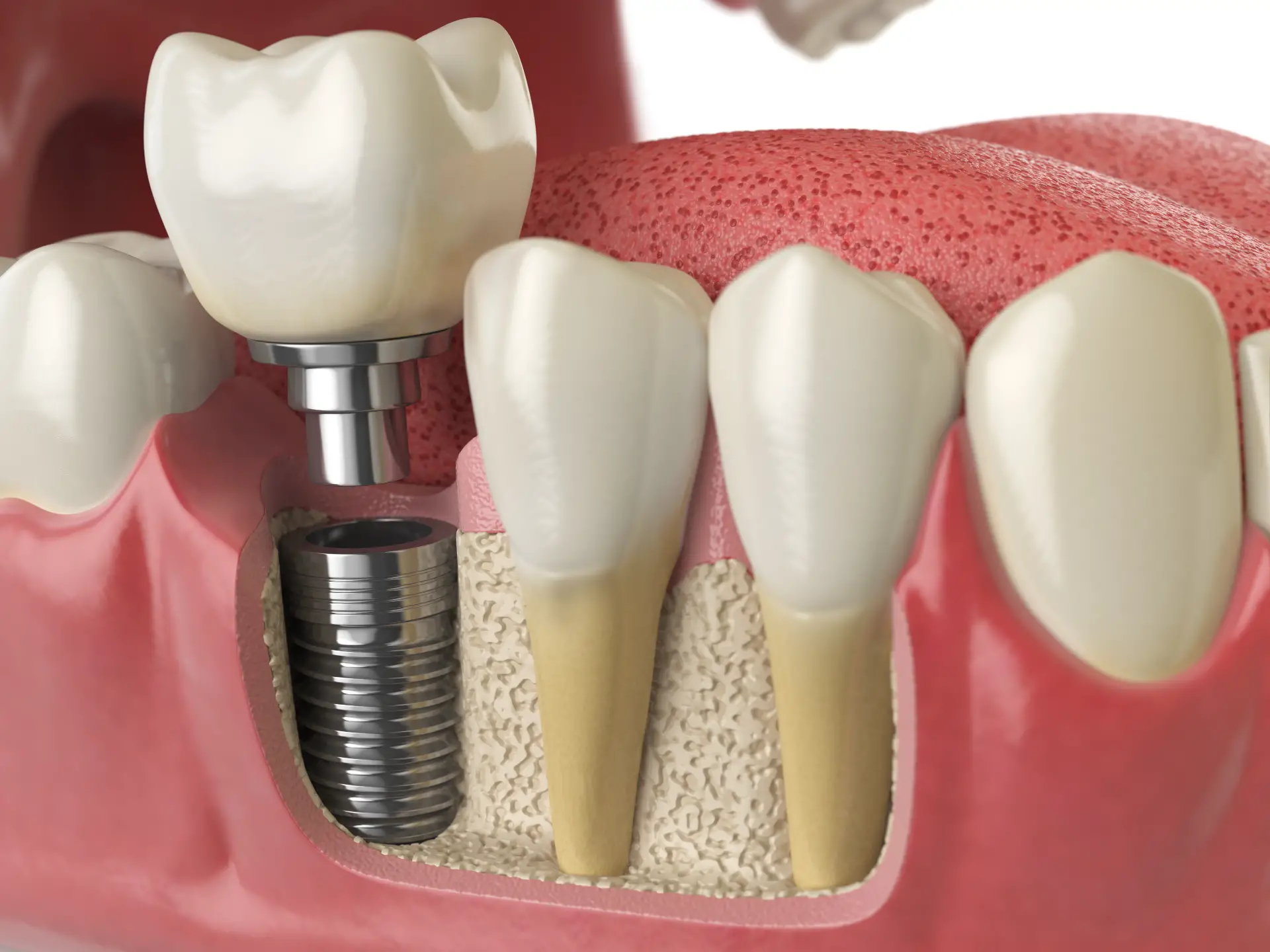Missing teeth can impact your life in more ways than you think. Not only can it hurt your confidence, but it can also cause trouble with eating, speaking clearly, and even lead to painful jaw problems. But there’s a solution with a remarkably high success rate: dental implants.
In this blog post, we’ll explore everything you need to know about the success of dental implants. You’ll learn what factors influence success, what the potential risks are, and how to compare dental implants to other tooth replacement options.
Imagine yourself smiling without hesitation, enjoying all your favorite foods, and feeling completely confident in your appearance. Dental implants could make that a reality. Let’s look at how they work and understand if they might be the right choice for you.
Key Takeaways
- Missing teeth impact more than your smile. They can affect eating, speech, and overall health.
- Dental implants are a reliable fix. They have very high success rates and look like natural teeth.
- Choose a qualified dentist and follow their instructions for the best results.
- Dental implants let you eat comfortably, smile confidently, and protect your jawbone.
- Consider the long-term benefits. Implants can be a worthwhile investment in your health.
Dental Implant Success Rate
If you’re considering replacing missing teeth, you’ll be glad to know that dental implants have remarkably high success rates. Let’s take a closer look at what those success rates are and what factors might influence them.
Current Success Rate of Dental Implants
Dental implants are considered one of the most reliable and successful tooth replacement options available. The overall success rate of dental implants is incredibly high, typically exceeding 95%. This means that for the vast majority of patients, dental implants function as intended, allowing them to regain full chewing ability, restore their smile, and improve their quality of life.
It’s important to note that “success rate” considers both short-term and long-term success. That means the implant properly integrates with the jawbone, the replacement tooth looks and feels natural, and the implant continues to function well over many years.
Related article: What is the Failure Rate of Dental Implants?
Analyze the Data
While the overall success rate of dental implants is incredibly high, it’s important to understand that there can be slight variations based on specific factors.
For instance, the location of the implant within the jaw makes a difference. Implants placed in the lower jaw generally have slightly higher success rates compared to those in the upper jaw. Additionally, a patient’s age can play a role, with younger patients typically experiencing slightly higher success rates.
Finally, the constant advancements in dental implant materials and surgical techniques continue to contribute to ongoing improvements in success rates over time.
Factors Influencing Dental Implant Success
While dental implants have a fantastic success rate, it’s important to understand the various factors that can play a role in how well they work. Let’s take a look at some of the key elements that contribute to a successful dental implant procedure:
1. Patient Health and Lifestyle
Your overall health and lifestyle habits have a significant impact on the success of dental implants. Here’s why:
- Medical conditions: Certain medical conditions, such as diabetes or osteoporosis, can slow down healing and affect the integration of the implant with the jawbone. It’s crucial to discuss any health conditions with your dentist prior to the procedure.
- Smoking: Smoking is a major risk factor for dental implant failure. It impairs blood flow, which is essential for proper healing, and increases the risk of infection.
- Oral hygiene: Good oral hygiene habits are essential for the long-term health of your teeth and gums. This is even more important with dental implants, as poor hygiene can increase the risk of infection around the implant site.
2. Technological Advances and Surgical Techniques
The world of dental implants is constantly evolving, with advancements in both materials and surgical procedures contributing to improved outcomes.
Modern dental implants are typically made of titanium, a biocompatible material that readily integrates with the jawbone. Ongoing research focuses on further enhancing surface properties and materials for even better success rates.
Advances in 3D imaging and computer-guided surgery allow dentists to plan implant placement with incredible precision. This minimizes surgical trauma and maximizes chances for successful integration.
3. Post-Operative Care and Maintenance
What you do after your dental implant procedure plays a crucial role in its long-term success. Your dentist will provide detailed aftercare instructions, and it’s essential to follow these carefully to promote proper healing and prevent complications. Regular dental checkups and cleanings are vital for monitoring the health of your dental implant and ensuring any potential issues are caught early.
Benefits of Dental Implants Beyond Success Rates
While the high success rate is a major draw of dental implants, they offer a wide range of benefits that go beyond just the numbers. Let’s explore some of the key reasons why dental implants are considered a superior tooth replacement option:
- Restored Functionality: Dental implants are designed to function just like your natural teeth. They allow you to chew all your favorite foods with comfort and confidence, improving your diet and overall well-being.
- Enhanced Aesthetics: Dental implants are meticulously crafted to match your existing teeth and blend seamlessly into your smile. This gives you a natural-looking, complete smile that enhances your appearance and boosts your self-esteem.
- Prevention of Bone Loss: When you lose a tooth, your jawbone no longer receives the necessary stimulation to maintain its density. Dental implants act as artificial tooth roots, stimulating the jawbone and preventing deterioration, which can lead to changes in your facial structure.
- Long-Term Solution: With proper care and maintenance, dental implants can last a lifetime. This potentially saves you time and money compared to other tooth replacement options that may require periodic replacements.
Dental implants offer a unique combination of reliability, functionality, and aesthetic appeal that makes them an exceptional investment in your oral health and overall quality of life.

Risks and How to Mitigate Them
Like any surgical procedure, dental implant placement carries some potential risks. However, it’s important to understand that the vast majority of cases are successful, and complications are relatively uncommon. Let’s look at some potential risks and how they can be minimized.
Common Risks and Complications
While most dental implant procedures are successful, here are some potential risks to be aware of:
- Infection: Infection at the implant site is a potential complication. Your dentist might prescribe antibiotics and emphasize proper aftercare to reduce this risk.
- Nerve damage: In rare cases, there’s a risk of injury to the nerves around the implant area, potentially causing numbness, tingling, or pain.
- Implant failure: In uncommon cases, the implant might fail to integrate with the jawbone or become loose.
Strategies for Risk Mitigation
Proactive steps and careful planning are crucial for reducing risks and maximizing your chances of a successful dental implant procedure.
The first important step is to choose an experienced surgeon who specializes in dental implants and has a proven track record of success. This ensures you are in the hands of a skilled professional who can perform the procedure with expertise. It’s also important to be transparent with your dentist about any existing health conditions or medications, as these factors can influence your treatment plan and help your dental professional tailor the process for your specific needs.
Following aftercare instructions provided by your dentist is absolutely essential. These instructions are specifically designed to promote healing and minimize complications. Along with following the dentist’s advice, maintaining good oral hygiene is vital for the long-term health of your implant. Finally, attending regular dental checkups allows for monitoring any potential issues early, ensuring they can be addressed promptly.
Alternatives to Dental Implants
While dental implants offer exceptional benefits, it’s important to understand that they might not be the ideal solution for everyone. Let’s explore some common alternatives to dental implants:
Bridges
A dental bridge is a fixed prosthetic device that replaces one or more missing teeth. It relies on the support of adjacent natural teeth, which are prepared to receive crowns. The bridge includes artificial teeth that fill the gap left by the missing teeth. Bridges offer a relatively quick and less invasive solution compared to implants but may require the alteration of healthy teeth.
Dentures
Dentures are removable appliances that replace missing teeth. They can be partial (replacing a few teeth) or complete (replacing all teeth in an arch). Dentures generally offer a more affordable tooth replacement option but can be less stable than implants. They may also take some time to get used to and may not feel as natural as implants.
Doing Nothing
In some cases, depending on the location of the missing tooth and individual circumstances, it might be possible to leave a gap without replacement. However, this is not always advisable as it can lead to problems with chewing, shifting of remaining teeth, and changes in facial structure due to bone loss.
It’s essential to consult with your dentist to determine the best tooth replacement option for your individual needs. They will consider factors like your overall health, the location of the missing teeth, and your personal preferences when making a recommendation.

The Investment in Yourself
While dental implants may have a higher upfront cost, considering the long-term benefits and the potential drawbacks of missing teeth can make them a worthwhile investment. The improvement in quality of life, renewed confidence, and preservation of your oral health could prove invaluable.
Is it Time to Consider Dental Implants?
If you’re struggling with the consequences of missing teeth, consult with a dental implant specialist. They can assess your suitability, discuss the procedure, and provide a cost estimate. Remember, the decision to invest in dental implants is a personal one, but the potential benefits might far outweigh the initial cost.
Ready to Reclaim Your Perfect Smile?
Missing teeth shouldn’t get in the way of enjoying your favorite foods, smiling with confidence, or feeling your absolute best. Our experts at Image Dental specialize in dental implants and are committed to providing personalized solutions that restore your smile and improve your life.
Schedule your consultation today and take the first step towards a healthier and happier you. Book now or call us at (209) 955-1500.



